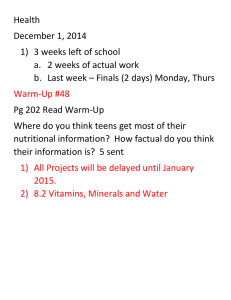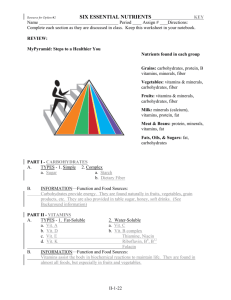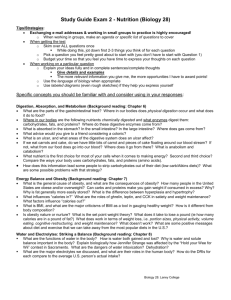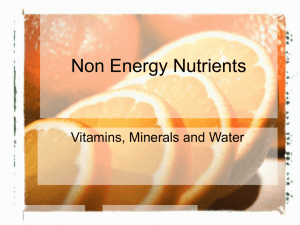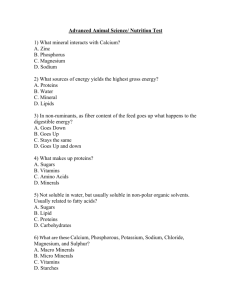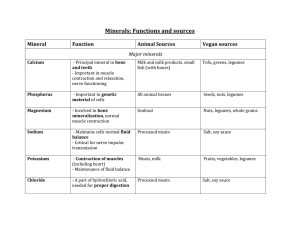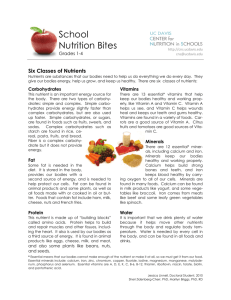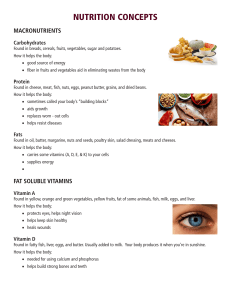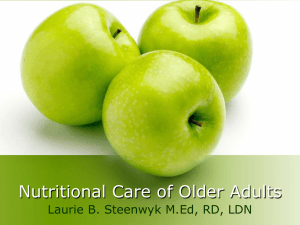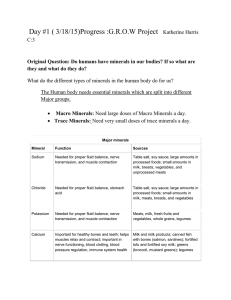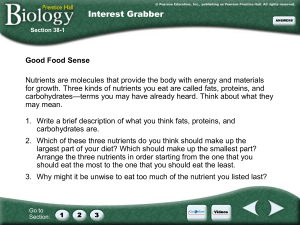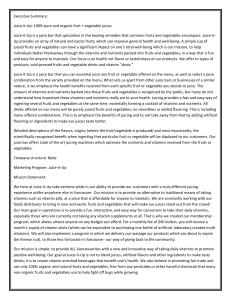FOODS 1---NUTRITION STUDY GUIDE
advertisement
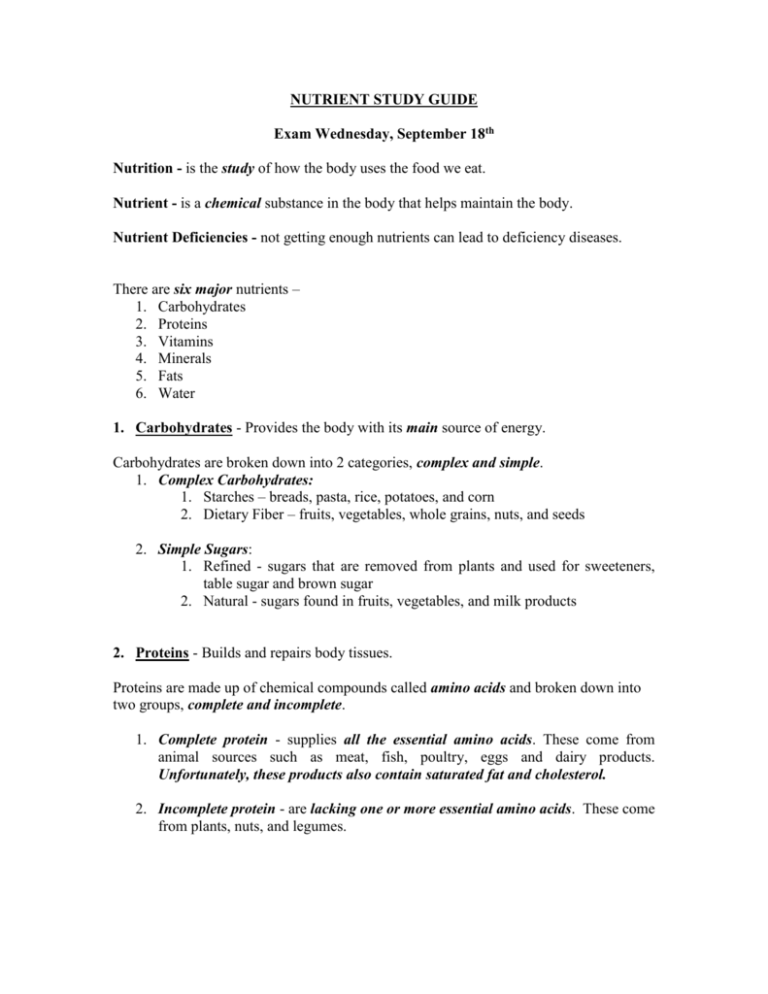
NUTRIENT STUDY GUIDE Exam Wednesday, September 18th Nutrition - is the study of how the body uses the food we eat. Nutrient - is a chemical substance in the body that helps maintain the body. Nutrient Deficiencies - not getting enough nutrients can lead to deficiency diseases. There are six major nutrients – 1. Carbohydrates 2. Proteins 3. Vitamins 4. Minerals 5. Fats 6. Water 1. Carbohydrates - Provides the body with its main source of energy. Carbohydrates are broken down into 2 categories, complex and simple. 1. Complex Carbohydrates: 1. Starches – breads, pasta, rice, potatoes, and corn 2. Dietary Fiber – fruits, vegetables, whole grains, nuts, and seeds 2. Simple Sugars: 1. Refined - sugars that are removed from plants and used for sweeteners, table sugar and brown sugar 2. Natural - sugars found in fruits, vegetables, and milk products 2. Proteins - Builds and repairs body tissues. Proteins are made up of chemical compounds called amino acids and broken down into two groups, complete and incomplete. 1. Complete protein - supplies all the essential amino acids. These come from animal sources such as meat, fish, poultry, eggs and dairy products. Unfortunately, these products also contain saturated fat and cholesterol. 2. Incomplete protein - are lacking one or more essential amino acids. These come from plants, nuts, and legumes. 3 Fats - Fats are essential to your diet for healthy skin and normal growth. They also carry the fat-soluble vitamins (A, D, E, & K). Fats are used for stored energy and broken down into two groups, fatty acids and cholesterol. 1. Fatty Acids 1. Saturated Fat – found in animal and dairy products, raises LDL – which clogs arteries 2. Polyunsaturated – found in olive, coconut, peanut oils, decreases LDL 3. Monounsaturated – found in corn and vegetable oils, decreases LDL and increases HDL 2. Cholesterol – 1. Low density lipoproteins – LDL - ”bad cholesterol” 2. High density lipoproteins – HDL - ”good cholesterol” 4 Vitamins - Vitamins are essential to keep body tissues healthy and many systems working properly. Vitamins are not sources of energy. There are two types of vitamins, water – soluble and fat – soluble. 1. Water – Soluble - dissolves in the water and cannot be stored. Your body eliminates what it doesn’t need. You need a supply of these vitamins every day. Vitamin C - found in most fruits and vegetables, especially citrus fruits, strawberries, mangoes, and peppers. Vitamin C helps to maintain a healthy immune system and skin. Thiamine - found in legumes, fish, lean meats, whole grain, and fortified breads and cereals. Thiamine makes energy out of carbohydrates. Riboflavin - found in lean meats, eggs, leafy green vegetables, nuts, legumes, fortified breads and cereals, and dairy products. Riboflavin is used for general body growth and energy. Niacin - found in dairy products, poultry, fish, lean meats, nuts, legumes and eggs. The body needs niacin for healthy skin and for converting the foods you eat to energy. Folate - found in leafy green vegetables such as spinach, fruits like oranges and strawberries, legumes and whole grains. Folate makes red blood cells and breaks down the proteins we eat. 2. Fat – Soluble - dissolves in the fat in your body. These can be stored and used when needed. These vitamins are A, D, E, and K. Vitamin A – promotes growth, keeps skin and mucus membranes healthy, and prevents night blindness. Found in dark green and yellow fruits and vegetables. Vitamin D – builds strong bones and teeth. Found in egg yolks, milk products, and from the sun. Vitamin E – Acts as an antioxidant to protect cell membranes. Found in eggs, salad oils, and whole grain cereals. Vitamin K – Prevents blood clot. Found in proteins, organ meats, and egg yolks. 5. Minerals – Minerals can be broken down into two groups, macro minerals and trace minerals. 1. Macro minerals - relatively large amounts are needed per day. Calcium – builds strong bones and teeth. Found in dairy products and leafy green vegetables. Magnesium – Helps cells use energy nutrients. Found in beans, dark green vegetables, and whole grains. Sodium, Chlorine, Potassium – Controls osmosis, maintains acid – base balance in the body. Sodium and Chlorine found in table salt. Potassium found in bananas. 2. Trace minerals – needed in very small amounts, but are just as important. Fluorine – helps prevent teeth decay. Found in toothpaste. Iodine – promotes normal function of thyroid gland. Found in table salt, saltwater fish, and shellfish. Iron – helps cells use oxygen. Found in dried beans and fruits, egg yolk, lean meats, and whole grains. Zinc – helps wounds heal and promotes normal growth. Found in legumes, meats, poultry, seafood, and whole grains. 6. Water – Water is essential for life. It aids digestion and cell growth and maintenance, facilitates chemical reactions, lubricates joints and cells, and regulates body temperature.
